How to Get Rid of Trojan Proxy Virus
What is "Proxy Virus"?
Proxy Virus (also known as MITM Proxy Virus) is a type of browser-hijacking program that has recently become popular. In order to spread this infection, cyber criminals often use various adware-type applications. In most cases, these infiltrate computers without users' permission.
Adware is also likely to deliver intrusive advertisements and record information relating to browsing activity.
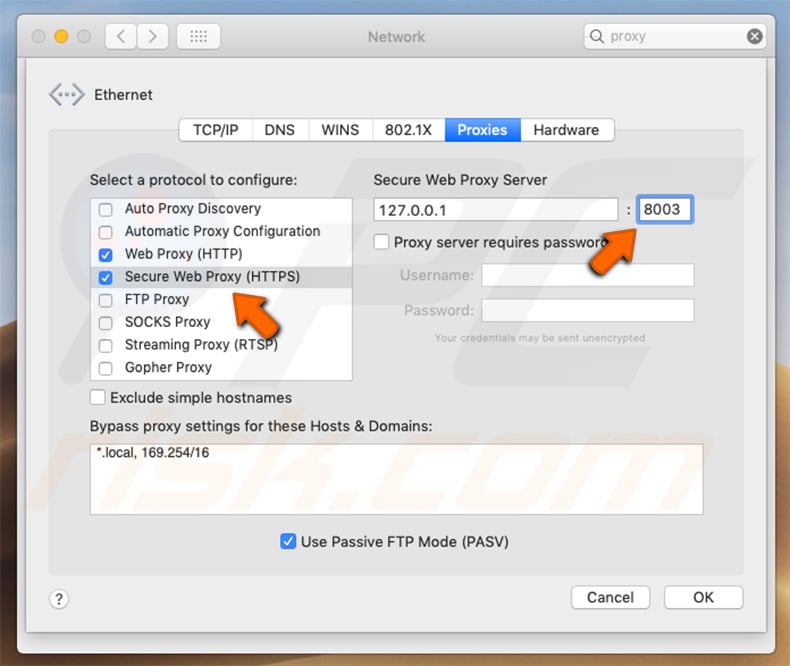
The initial adware installation process seems normal. After installation, however, users are presented with a deceptive pop-up message encouraging them to update the Safari web browser. After clicking "OK", users are presented with another pop-up that asks users to enter account credentials.
In this way, users might inadvertently grant adware permission to control the Safari browser. Additionally, rogue installers deploy a 'bash script' designed to connect to a remote server and download a .zip archive. The archive is then extracted and a .plist file contained within it is copied to the LaunchDaemons directory.
The .plist file contains a reference to another file called "Titanium.Web.Proxy.Examples.Basic.Standard". Two additional scripts ("change_proxy.sh" and "trush_cert.sh") are executed after the next reboot. The "change_proxy.sh" script is designed to change the system proxy settings, thereby making it use HTTP/S proxy at "localhost:8003".
The "trush_cert.sh" script is designed to install a trusted SSL certificate into the keychain. Cyber criminals responsible for this infection use Titanium Web Proxy - an open-source asynchronous HTTP(S) proxy writen in C Sharp (C#). Titanium Web Proxy it is a cross-platform proxy, meaning that it can run on various operating systems, including MacOS.
The purpose of this infection is to hijack search engines. Cyber criminals use it to modify Internet search results. Using a proxy to achieve this is rather unusual, since cyber criminals typically employ fake search engines. They use various browser-hijacking applications to modify settings (e.g., new tab URL, default search engine, homepage) by assigning them to certain URLs.
Promoted websites often seem normal and their design is usually similar to Bing, Yahoo, Google, and other legitimate search engines. Yet, fake search engines can generate results that lead to malicious websites. Moreover, noticing that such browser settings have been modified is simple because users continually encounter redirects to dubious sites.
Using tools such as Proxy Virus is more difficult for these criminals, and yet also more reliable from their point of view. Cyber criminals also deliver fake search results by modifying the content of legitimate search engines.
For instance, if a user attempts to search using the Google search engine, the entire website (URL, header, footer, etc.) is genuine, however, the infection modifies the result section. In this way, users are fed with fake results even though they search using legitimate engines.
Ultimately, this behavior can lead to further high risk infections - users might inadvertently visit malicious websites. Additionally, cyber criminals use such tactics to increase the traffic of certain websites, which allows them to generate revenue through advertising.
The presence of Proxy Virus significantly diminishes the browsing experience and can lead to further computer infections. As mentioned above, adware-type applications are designed to deliver advertisements (e.g., coupons, banners, pop-ups, etc.). These ads might also redirect to malicious websites and even run scripts designed to download/install other unwanted apps.
Therefore, clicking them can also lead to installation of infectious apps. Additionally, ads are delivered using tools that enable placement of third party graphical content on any site. Therefore, they often conceal website content, thereby diminishing the browsing experience.
Adware-type apps gather information such as IP addresses, website URLs visited, pages viewed, search queries, and other similar details, which are later shared with third parties (potentially, cyber criminals). These people generate revenue by misusing private data.
Therefore, information tracking might eventually lead to serious privacy issues, or even identity theft. You are advised to remove all infections, including adware and Proxy Virus.
| Name | MITM Proxy virus |
| Threat Type | Mac malware, Mac virus, Proxy hijacker, Search hijacker |
| Detection Names (Adobe Flash Player-3.dmg - Fake Adobe Flash Player installer) | Avast (MacOS:Agent-EN [Drp]), BitDefender (Adware.MAC.Bundlore.DMM), Emsisoft (Adware.MAC.Bundlore.DMM (B)), Kaspersky (Not-a-virus:HEUR:AdWare.OSX.Bnodlero.q), Full List (VirusTotal) |
| Symptoms | You see inaccurate search results, your Mac and Internet speed become slower than normal, you see unwanted pop-up ads, you are redirected to dubious websites. |
| Distribution methods | Deceptive pop-up ads, free software installers (bundling), fake flash player installers, torrent file downloads. |
| Damage | Internet browsing tracking (potential privacy issues), display of unwanted ads, redirects to dubious websites, loss of private information. |
| Malware Removal (Mac) | To eliminate possible malware infections, scan your Mac with legitimate antivirus software. Our security researchers recommend using Combo Cleaner. |
There are dozens of adware-type applications and browser hijackers online. Typically, these applications offer "useful features" in attempts to give the impression of legitimacy and trick users to install, however, the only purpose of these applications is to generate revenue for the developers.
Rather than giving any real value for regular users, PUAs cause redirects, deliver advertisements, modify settings, and record information.
How did potentially unwanted applications install on my computer?
Adware and browser-hijacking applications are usually proliferated via intrusive advertisements and a deceptive marketing method called "bundling" - stealth installation of third party applications together with regular (usually free) software. Developers know that users often rush download/installation processes and skip steps.
Therefore, "bundled" apps are usually concealed behind "Custom/Advanced" settings (or other sections) of these procedures. By carelessly skipping download/installation steps and clicking on advertisements, many users expose their systems to risk of infections and compromise their privacy.
How to avoid installation of potentially unwanted applications?
To prevent this situation, be very cautious when browsing the internet and downloading/installing software. We strongly recommend that you download your software from official sources only, preferably using direct download links. Third party downloaders/installers are typically monetized using the "bundling" method, and thus such tools should never be used.
Do some research before downloading unknown software just to confirm that it is legitimate and virus-free. Intrusive advertisements typically seem legitimate, however, once clicked, they redirect to dubious websites (gambling, adult dating, pornography, and similar).
If you continually encounter these ads and redirects, remove all suspicious applications and browser plug-ins immediately. If your computer is already infected with PUAs, we recommend running a scan with Combo Cleaner Antivirus for macOS to automatically eliminate them.
Fake Adobe Flash Player installer promoting Proxy Virus (step 1):

Fake Adobe Flash Player installer promoting Proxy Virus (step 2):
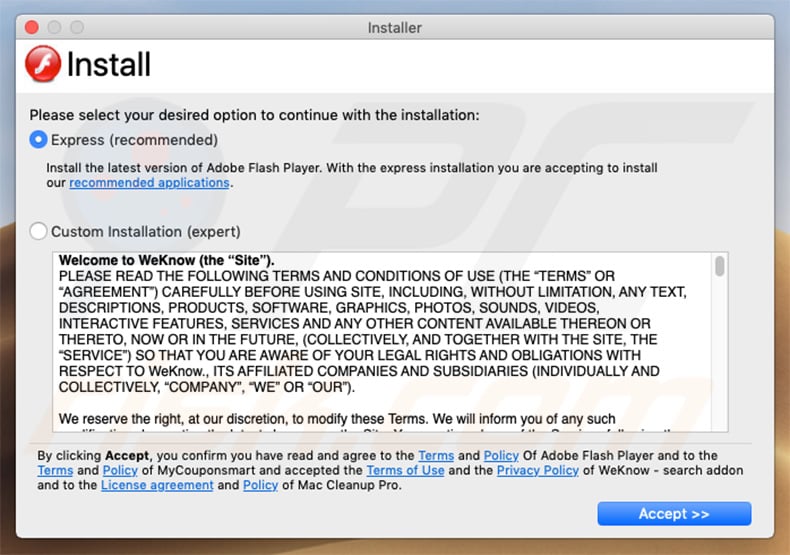
Instant automatic Mac malware removal: Manual threat removal might be a lengthy and complicated process that requires advanced computer skills. Combo Cleaner is a professional automatic malware removal tool that is recommended to get rid of Mac malware. Download it by clicking the button below:
▼ DOWNLOAD Combo Cleaner for Mac By downloading any software listed on this website you agree to our Privacy Policy and Terms of Use. To use full-featured product, you have to purchase a license for Combo Cleaner. Limited seven days free trial available. Combo Cleaner is owned and operated by Rcs Lt, the parent company of PCRisk.com read more.
Quick menu:
- What is "Proxy Virus"?
- STEP 1. Remove PUA related files and folders from OSX.
- STEP 2. Remove rogue extensions from Safari.
- STEP 3. Remove rogue add-ons from Google Chrome.
- STEP 4. Remove potentially unwanted plug-ins from Mozilla Firefox.
Video showing how to remove adware and browser hijackers from a Mac computer:
Potentially unwanted applications removal:
Remove potentially unwanted applications from your "Applications" folder:
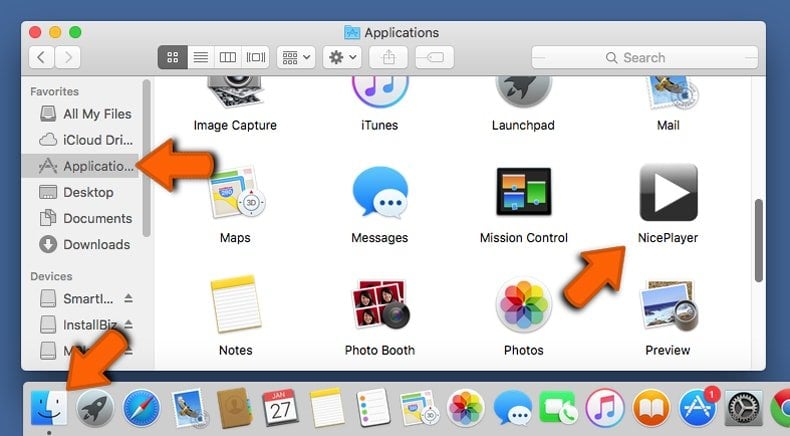
Click the Finder icon. In the Finder window, select "Applications". In the applications folder, look for "MPlayerX","NicePlayer", or other suspicious applications and drag them to the Trash. After removing the potentially unwanted application(s) that cause online ads, scan your Mac for any remaining unwanted components.
Remove mitm proxy virus related files and folders:
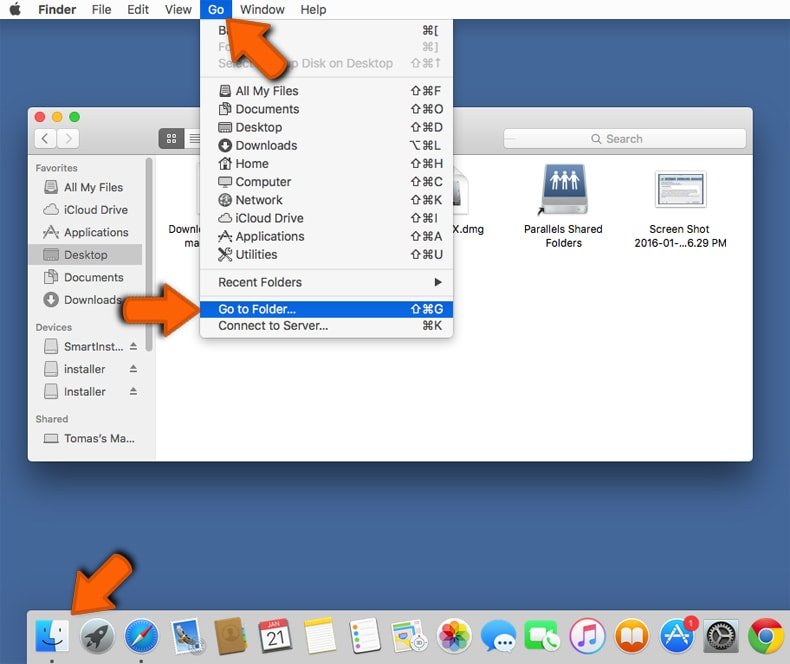
Click the Finder icon, from the menu bar. Choose Go, and click Go to Folder...
 Check for adware-generated files in the /Library/LaunchAgents folder:
Check for adware-generated files in the /Library/LaunchAgents folder:
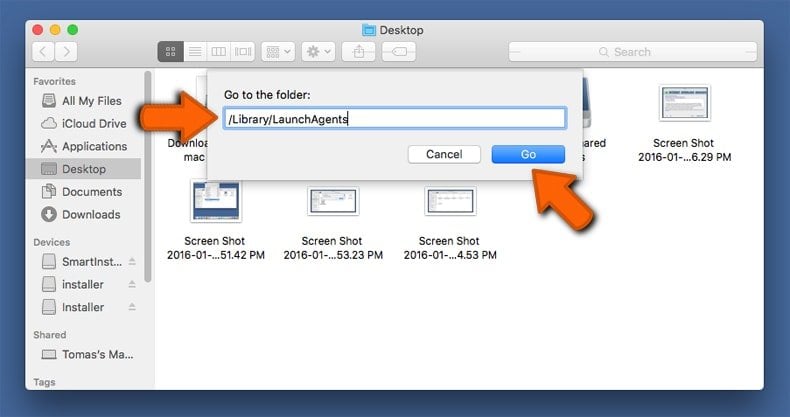
In the Go to Folder... bar, type: /Library/LaunchAgents
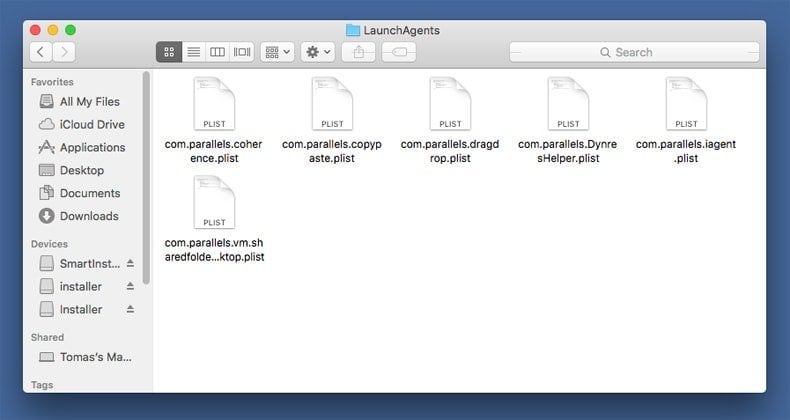
In the "LaunchAgents" folder, look for any recently-added suspicious files and move them to the Trash. Examples of files generated by adware - "installmac.AppRemoval.plist", "myppes.download.plist", "mykotlerino.ltvbit.plist", "kuklorest.update.plist", etc. Adware commonly installs several files with the same string.
 Check for adware generated files in the /Library/Application Support folder:
Check for adware generated files in the /Library/Application Support folder:
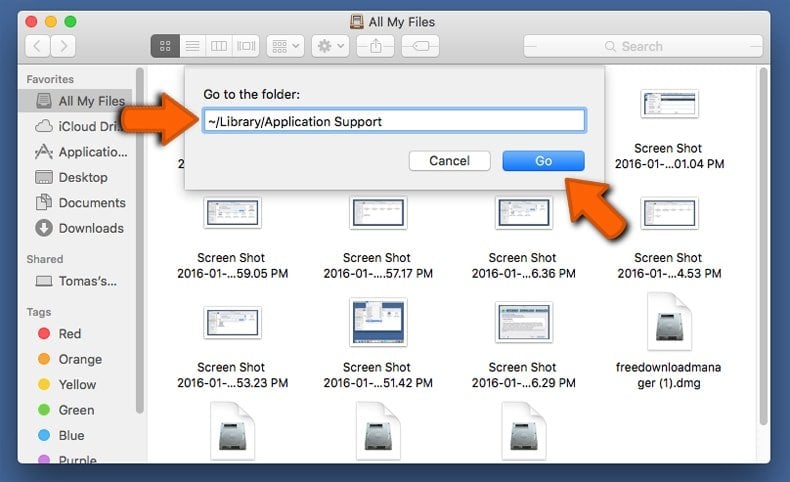
In the Go to Folder... bar, type: /Library/Application Support
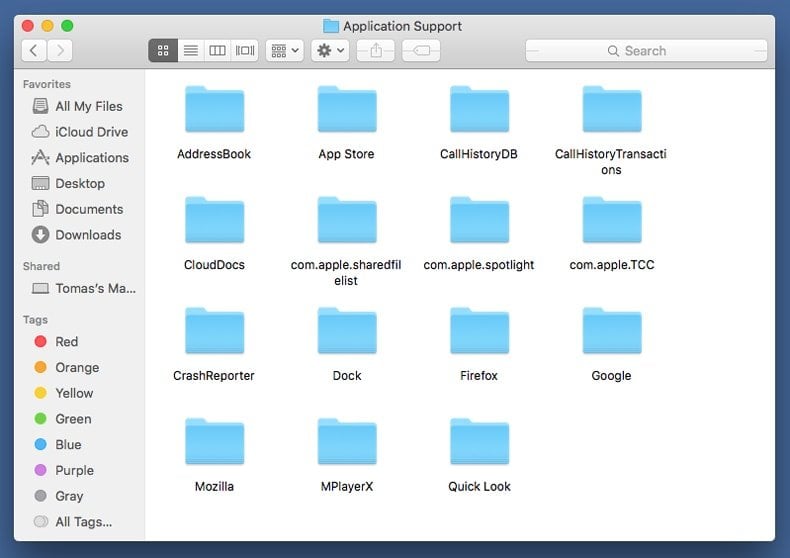
In the "Application Support" folder, look for any recently-added suspicious folders. For example, "MplayerX" or "NicePlayer", and move these folders to the Trash.
 Check for adware-generated files in the ~/Library/LaunchAgents folder:
Check for adware-generated files in the ~/Library/LaunchAgents folder:
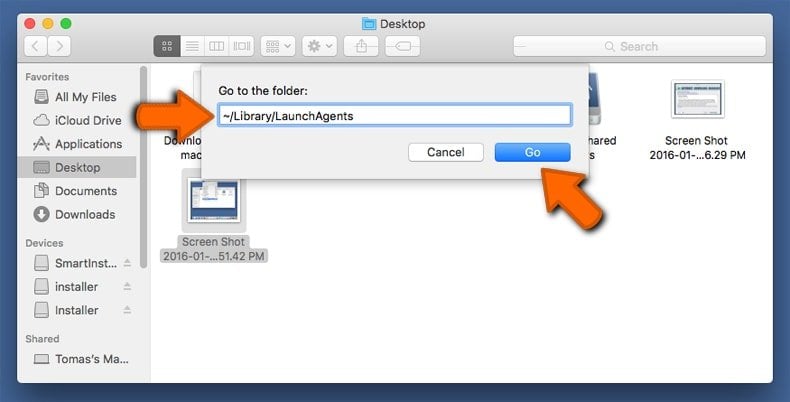
In the Go to Folder bar, type: ~/Library/LaunchAgents
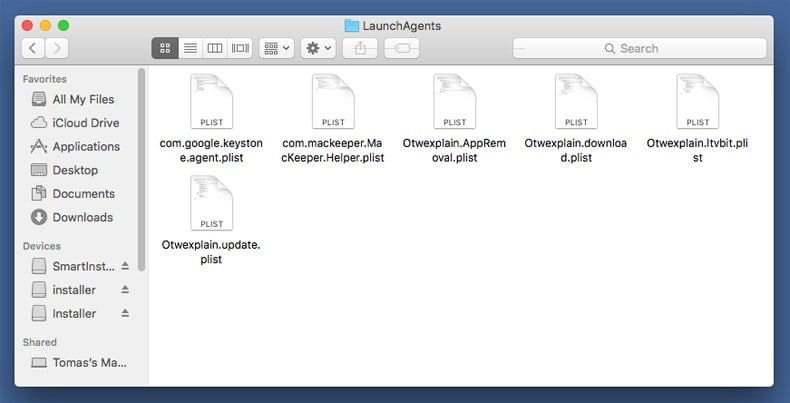
In the "LaunchAgents" folder, look for any recently-added suspicious files and move them to the Trash. Examples of files generated by adware - "installmac.AppRemoval.plist", "myppes.download.plist", "mykotlerino.ltvbit.plist", "kuklorest.update.plist", etc. Adware commonly installs several files with the same string.
 Check for adware-generated files in the /Library/LaunchDaemons folder:
Check for adware-generated files in the /Library/LaunchDaemons folder:
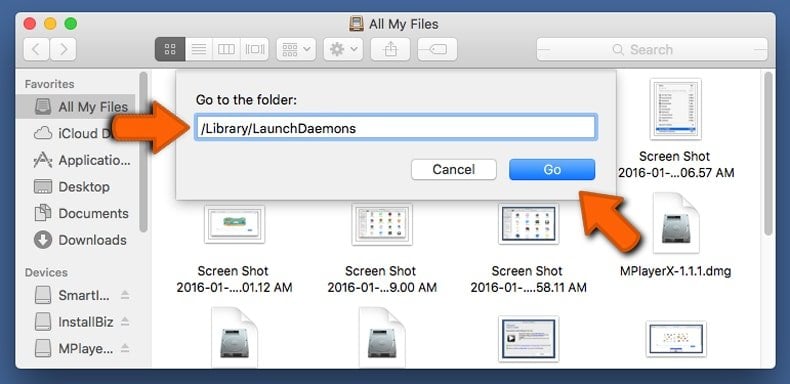
In the Go to Folder... bar, type: /Library/LaunchDaemons
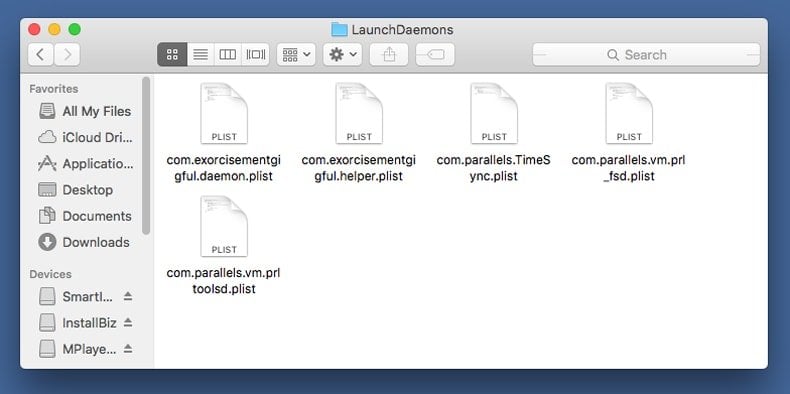
In the "LaunchDaemons" folder, look for recently-added suspicious files. For example "com.aoudad.net-preferences.plist", "com.myppes.net-preferences.plist", "com.kuklorest.net-preferences.plist", "com.avickUpd.plist", etc., and move them to the Trash.
 Scan your Mac with Combo Cleaner:
Scan your Mac with Combo Cleaner:
If you have followed all the steps in the correct order you Mac should be clean of infections. To be sure your system is not infected run a scan with Combo Cleaner Antivirus. Download it HERE. After downloading the file double click combocleaner.dmg installer, in the opened window drag and drop Combo Cleaner icon on top of the Applications icon. Now open your launchpad and click on the Combo Cleaner icon. Wait until Combo Cleaner updates it's virus definition database and click "Start Combo Scan" button.
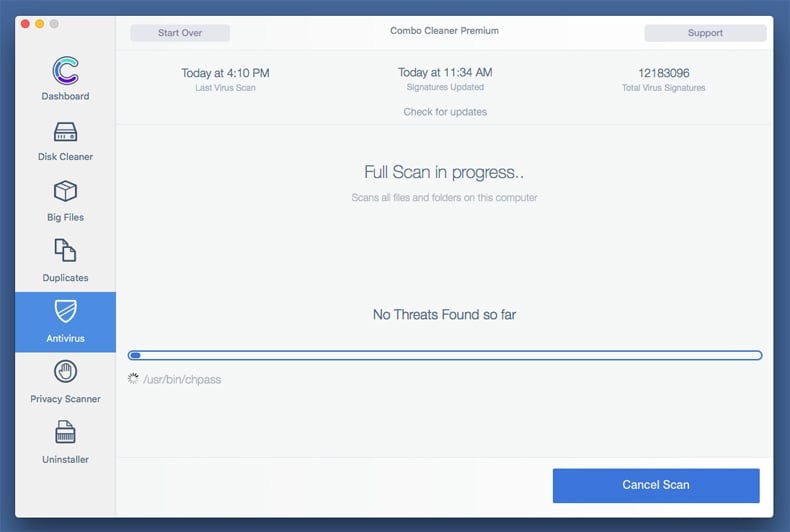
Combo Cleaner will scan your Mac for malware infections. If the antivirus scan displays "no threats found" - this means that you can continue with the removal guide, otherwise it's recommended to remove any found infections before continuing.
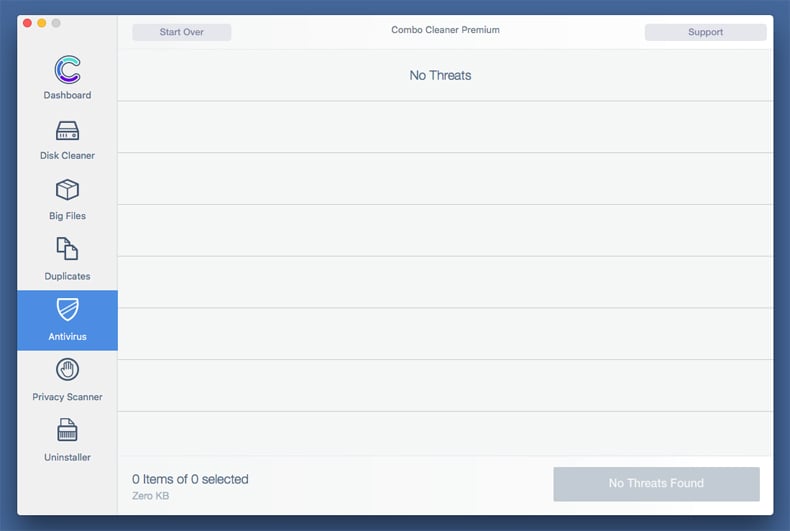
After removing files and folders generated by the adware, continue to remove rogue extensions from your Internet browsers.
MITM Proxy virus removal from Internet browsers:
 Remove malicious extensions from Safari:
Remove malicious extensions from Safari:
Remove mitm proxy virus related Safari extensions:
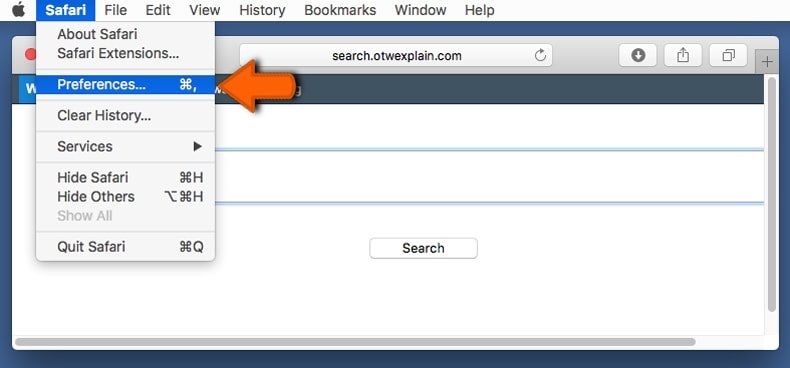
Open Safari browser, from the menu bar, select "Safari" and click "Preferences...".

In the preferences window, select "Extensions" and look for any recently-installed suspicious extensions. When located, click the "Uninstall" button next to it/them. Note that you can safely uninstall all extensions from your Safari browser - none are crucial for normal browser operation.
- If you continue to have problems with browser redirects and unwanted advertisements - Reset Safari.
 Remove malicious plug-ins from Mozilla Firefox:
Remove malicious plug-ins from Mozilla Firefox:
Remove mitm proxy virus related Mozilla Firefox add-ons:
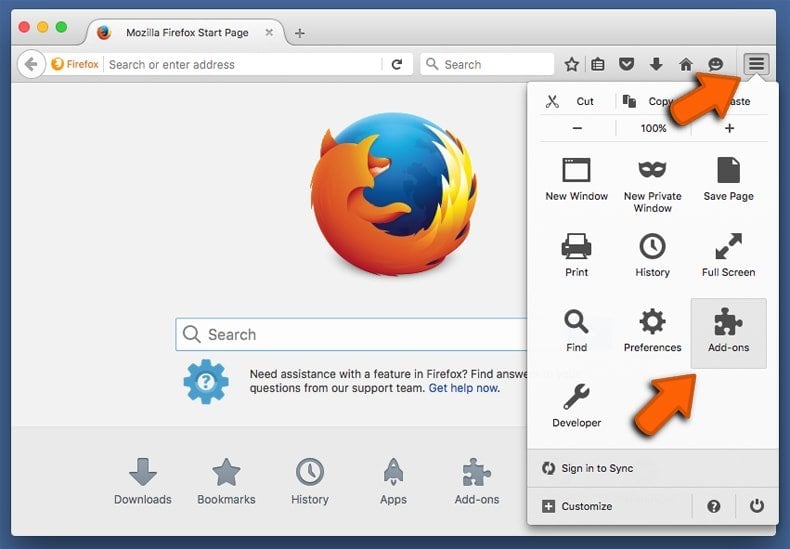
Open your Mozilla Firefox browser. At the top right corner of the screen, click the "Open Menu" (three horizontal lines) button. From the opened menu, choose "Add-ons".
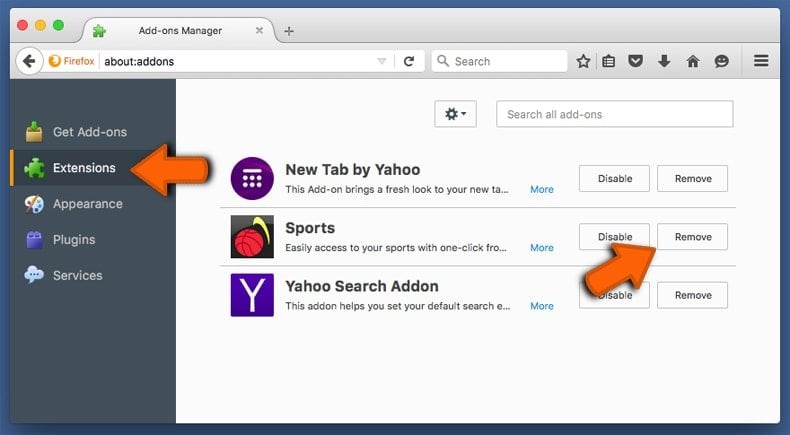
Choose the "Extensions" tab and look for any recently-installed suspicious add-ons. When located, click the "Remove" button next to it/them. Note that you can safely uninstall all extensions from your Mozilla Firefox browser - none are crucial for normal browser operation.
- If you continue to have problems with browser redirects and unwanted advertisements - Reset Mozilla Firefox.
 Remove malicious extensions from Google Chrome:
Remove malicious extensions from Google Chrome:
Remove mitm proxy virus related Google Chrome add-ons:
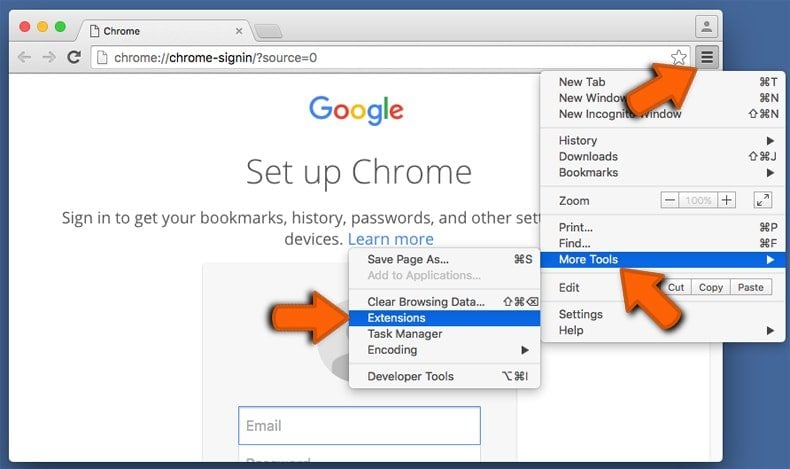
Open Google Chrome and click the "Chrome menu" (three horizontal lines) button located in the top-right corner of the browser window. From the drop-down menu, choose "More Tools" and select "Extensions".
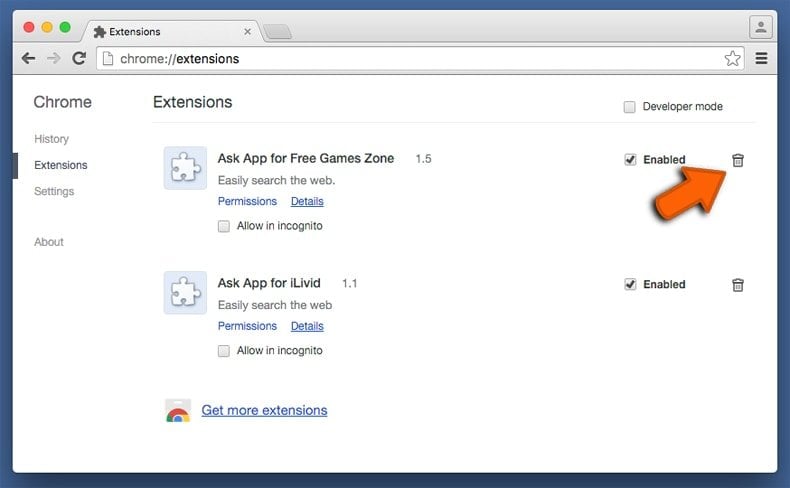
In the "Extensions" window, look for any recently-installed suspicious add-ons. When located, click the "Trash" button next to it/them. Note that you can safely uninstall all extensions from your Google Chrome browser - none are crucial for normal browser operation.
- If you continue to have problems with browser redirects and unwanted advertisements - Reset Google Chrome.
About the author:

Tomas Meskauskas - expert security researcher, professional malware analyst.
I am passionate about computer security and technology. I have an experience of over 10 years working in various companies related to computer technical issue solving and Internet security. I have been working as an author and editor for pcrisk.com since 2010. Follow me on Twitter and LinkedIn to stay informed about the latest online security threats. Contact Tomas Meskauskas.
PCrisk security portal is brought by a company RCS LT. Joined forces of security researchers help educate computer users about the latest online security threats. More information about the company RCS LT.
Our malware removal guides are free. However, if you want to support us you can send us a donation.
How to Get Rid of Trojan Proxy Virus
Source: https://www.pcrisk.com/removal-guides/15141-proxy-virus-mac